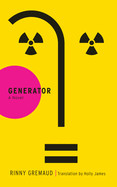
 Korean Swiss journalist Rinny Gremaud's debut novel, Generator, provides a deeply meditative examination of identity--"relative, if not fluid"--provocatively conflating nuclear power with biological ancestry. Holly James smoothly translates from the original French. In 1977, the narrator was born at Kori, the site of a nuclear power plant in Busan, Korea. Her Korean mother's English fluency got her a job with a British company, where she met her daughter's father, a British engineer. Once reactor Kori 1 was complete, however, the father left Korea, abandoning mother and child.
Korean Swiss journalist Rinny Gremaud's debut novel, Generator, provides a deeply meditative examination of identity--"relative, if not fluid"--provocatively conflating nuclear power with biological ancestry. Holly James smoothly translates from the original French. In 1977, the narrator was born at Kori, the site of a nuclear power plant in Busan, Korea. Her Korean mother's English fluency got her a job with a British company, where she met her daughter's father, a British engineer. Once reactor Kori 1 was complete, however, the father left Korea, abandoning mother and child.
Forty years later, in 2017, Kori's shutdown is imminent, which "unearth[s] something in the depths of [the protagonist's] conscience." At 40 herself, she's part of her own household in Switzerland, "made up of two adults and two children." This end of "the first atomic age" triggers a backward gaze: "The word 'generator' resounded throughout my childhood.... It seemed to mean many things at once: generator as in genitor, birth, and spark. Generator as in father." The search commences to geographically trace "this absentee" across the world: "I'll constitute a genitor for myself from the little information I have."
At 16, this genitor left his widowed mother to become an engineering apprentice in the Port of Holyhead, Wales, in 1951. At 20, he spent 10 years with the U.K. lighthouse authority, then to Wylfa, a nuclear construction site on the Isle of Anglesey. After promising a local girl he'd return, he moved to Taiwan, where he would marry and father two children, before his "stint in South Korea." He then returned to his wife, relocated to the U.S, had two more children, and settled at his last known address, in Monroe, Mich. In following his trajectory, the protagonist also seeks "the power plants on [his] curriculum vitae, some nuclear, some thermal," plotting the potential points of implosion, physically and emotionally.
Gremaud writes in first person, eschewing names, as if names--like her protagonist's--are unreliable. She uses "you" to address the missing father, unapologetically creating his life on the page: "It doesn't matter whether you find this life resembles your own.... If you didn't want it to be this way, all you had to do was tell me the story yourself.... It was your cowardice that gave me my omnipotence." In the four decades of his absence, she's earned the right to imagine him to life--and then decide whether to hold or discard him. --Terry Hong
Shelf Talker: In her debut novel, Generator, a Swiss Korean journalist deftly explores identity through a mixed-race narrator re-creating the British father who abandoned her 40 years ago.

